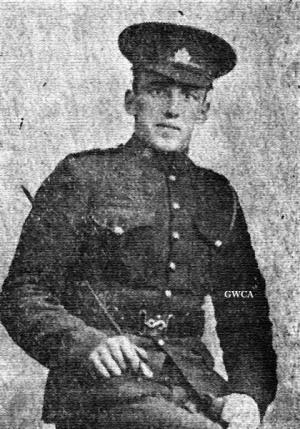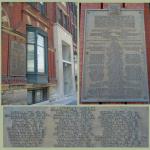Circumstances of Casualty: Killed in Action.
Location of Unit at Time of Casualty: Trenches near the bluff, Ypres.
BX April 28, 1916
Signaller Albert Hamilton a War Victim
That her brother, Signaller Albert Hamilton, had been killed in action was the word received yesterday by Mrs. Stephen Cara, who is now living at 280 Park Avenue. Signaller Hamilton went overseas with the first contingent and was wounded once before at the battle of Ypres. He is an engineer by trade and was formerly employed at the Massey-Harris works.
Mrs. Cara’s husband, who is an ex-policeman, went overseas with the Canadian Mounted Rifles and according to a recent letter received by Mrs. Cara he was injured by a fall from a horse. She is now preparing to go to England. Private Hamilton had been expecting to see her there.
BX May 5, 1916
Killed by Bomb From Mortar – More Particulars Received of Death of Signaller Albert Hamilton
Further particulars of the death of Signaller A. Hamilton, brother of Mrs. Stephen Cara, and himself a Brantford man, are to hand in a letter written by Lieut. (formerly Sergt.) J.W.E. Hart, of the 4th Battalion.
The letter reads:
Dear Friend,
I fear I have some very bad news for you, though you will doubtless have heard it before this. Even so, I have no doubt that you will wish to know fuller particulars about poor Albert Hamilton’s death.
Believe me his loss is a very sad one which will be hard indeed to fill. He was always cheerful and level headed under all circumstances a great thing in a signaller. I was going to promote him as soon as possible. I may say he was killed instantly and suffered no pain.
He with two other men, were on a station of which Albert was in command when the enemy began bombing that section of trench with trench-mortars. The officer in charge came to the phone to ask for artillery support. He was slightly wounded by a piece of a bomb and Albert sent one of his signallers to take the officer to the rear and asked for artillery retaliation himself and was reporting the effect of the fire when the bomb that killed him fell on his dugout. He was buried by the 1st Brigade chaplain, Capt. Gordon. I was present at the service myself.
I have been a chum of Albert’s for a long time and we have been together all through this war. I was in the signallers of the 38th, the Duffs, with him and was in the orchard at Festubert in the same trench. Since then he has been working as a signaller with me. In the last place we were in, he was in command of our “report centre,” a very important station, through which all reports and messages to our companies came and went. Indeed we shall miss him as a signaller and a comrade. He was always so cheerful and humorous and the men on his station were always happy, partly because he always looked after them.
I fear I can write no more now. Will you please pass this letter on to any other friends and relatives you may know? Good-bye with deepest sympathy.
Yours sincerely,
W.E. Hart, Lieut.,
O.C. Signallers, 4th Batt.,
First Canadian Division


